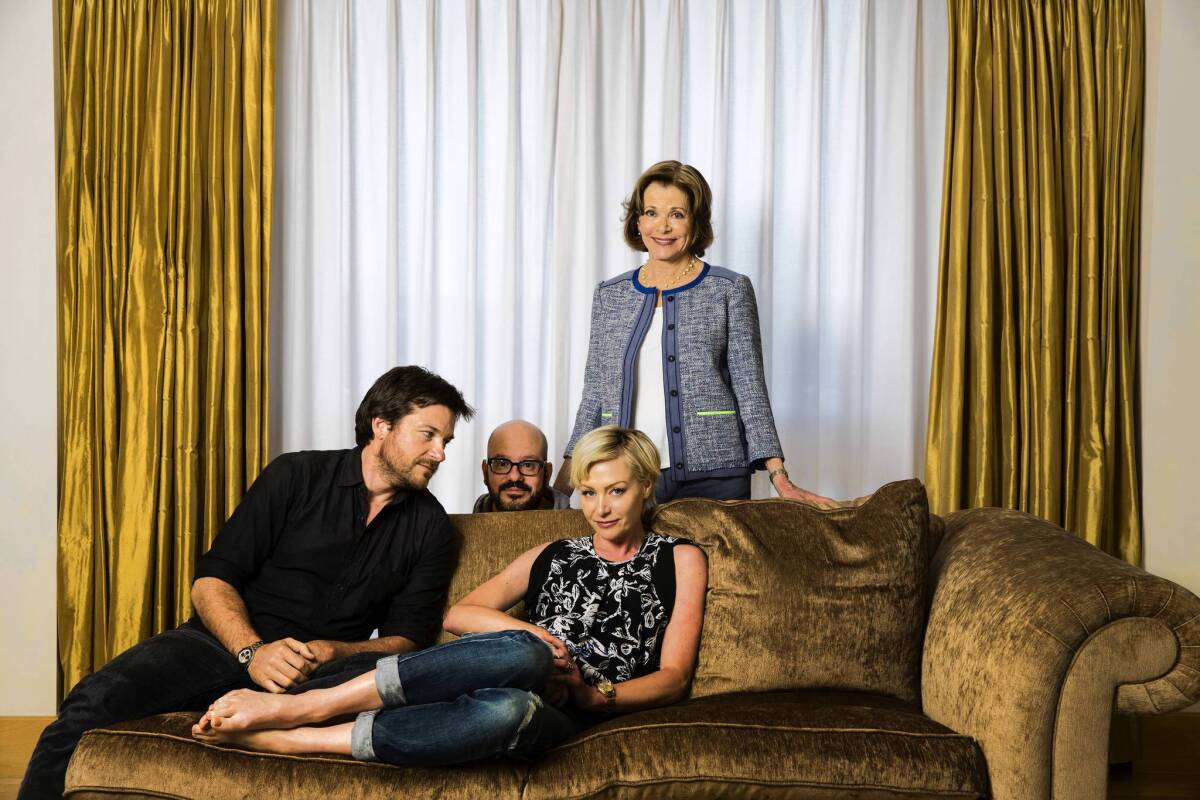‘Arrested Development’s’ return a Bluth saga in itself

Just two days before “Arrested Development” would release its first new episodes in seven years, creator Mitchell Hurwitz called David Cross with a frantic request: Could the actor do a quick reshoot? Cross, however, was sporting a full, dyed beard for another project and looked nothing like his “Arrested” character. No matter, Hurwitz told him, “We’ll figure it out.” The next day the actor found himself on a hastily arranged set, filling in a gap on the series that would premiere in Hollywood the following day.
“It’s crazy!” Cross says. “It’s nuts!”
It’s “Arrested Development” reborn, not as a feature film, as had been long rumored and planned, but as a new batch of 15 interconnected episodes that will drop simultaneously May 26 on Netflix. The nine original cast members from the series, which enjoyed a critically acclaimed, ratings-challenged 53-episode run on Fox from 2003 to 2006, have all returned, picking up the madcap saga of the infighting Bluth family where we last left off and taking it forward with an ambitious approach that should delight the show’s obsessive fans.
“It keeps getting branded as Season 4, and it’s not that,” says Jason Bateman, who plays the Bluth family’s sensible son, Michael. “The danger there is that it’s compared with the first three seasons, which is not something Mitch wanted to do. That would be a retread. And Mitch just isn’t that easily amused.”
Hurwitz (who was hunkered down, editing and abstaining from interviews at press time) originally planned a nine-episode Netflix run, with one installment devoted to each character. Then it became a 10-episode run. Then 14. And finally 15, with six characters receiving two episodes, including Cross, a fan favorite for his turn as the “never nude” Tobias, discredited shrink, aspiring actor and husband to spoiled Bluth daughter Lindsay (Portia de Rossi). Cross’ second episode, which necessitated the aforementioned pickup shot, came so late that De Rossi didn’t even know about it until he told her after the recent premiere.
The elaborate structure came from necessity. Syncing the schedules of nine busy actors for a more traditional storytelling format would have been nearly impossible. And undesirable. It freed Hurwitz to fashion what Cross calls the “most ambitious Venn diagram ever created,” tracking characters through past and present, telling the same story from different points of view and creating a kind of choose-your-own-adventure framework that will allow (force?) Netflix subscribers to toggle between episodes to fully appreciate the dense doings.
TIMELINE: Emmy winners through the years
The cast members themselves still don’t fully understand what they shot, and any actors’ gathering — be it the splashy premiere in late April at the Chinese Theatre or a group interview like this one in which Cross, De Rossi, Bateman and Jessica Walter gathered at a Beverly Hills hotel suite — includes requisite huddling sessions where information is shared and theories are floated.
“The curiosity among the actors is as high as the fans’,” says Alia Shawkat, who plays Maeby, Lindsay and Tobias’ rebellious daughter. Shawkat, speaking separately by phone, says she shot her episode without ever seeing a script. Pages were written on the fly, sometimes during filming. De Rossi remembers shooting an awkward love scene with Terry Crews when Hurwitz swiveled his laptop toward the pair so they could read the freshly minted dialogue.
There is agreement that Bateman’s episodes, the ones that were shown at the Chinese and officially numbered 1 and 2 in the new “anthology,” are the best place to start. There you’ll see an update on the always shaky Bluth family finances, the establishment of a killer Cuatro de Mayo celebration that’s integral to all the story lines and a meta-proposal for a movie about the Bluth family to be directed by ... Ron Howard (who executive produced and narrated the original series).
THE ENVELOPE: The awards insider
But even here, revelations and utter confusion happily coexist. Watching the episodes for the first time, Bateman saw Michael Cera, who plays his devoted son, George Michael, sporting a mustache in one quick scene and couldn’t, for the life of him, remember ever seeing it before, much less why it was there. A lengthy conversation in another scene that Bateman assumed was between his character and family patriarch George Sr. (Jeffrey Tambor) was, in fact, between Michael and Oscar, George Sr.’s meek twin brother.
“That was Oscar?” asks a bewildered Walter, who plays the family’s manipulative, martini-swilling mother. “I had no idea!”
“I had no idea when I was acting the scenes,” Bateman replies, laughing.
“I remember one scene with David, and I was just sort of talking to him, and Mitch said, ‘No, no, you’ve got to be really paranoid,’” Bateman says. “‘Well, why?’ ‘Oh, I forgot. In something I haven’t written yet, you overhear him on a phone call.’ The idea of full context was always out the window.”
Adds Walter: “My feeling is it might be some of the best work I’ve ever done — or the worst.”
More to Read
From the Oscars to the Emmys.
Get the Envelope newsletter for exclusive awards season coverage, behind-the-scenes stories from the Envelope podcast and columnist Glenn Whipp’s must-read analysis.
You may occasionally receive promotional content from the Los Angeles Times.










